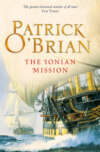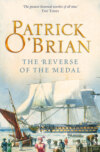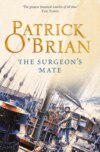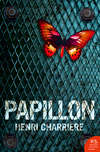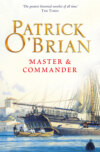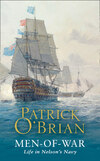Kitabı oku: «The Ionian Mission», sayfa 3
‘Are not the Frenchmen all shut up in Rochefort and Brest?’
‘Their ships of the line: but when it comes on to blow hard from the east and our squadrons have to run for Torbay, their frigates slip out and chew up our merchantmen something cruel. I dare say we shall have a convoy to see down to the Straits. And then there are the privateers too, very presumptuous reptiles in the Bay. Still, the receiving ships may give us some decent drafts: the Captain has good friends in Plymouth. I hope so indeed, because there is no man in the service to work them up into a smart crew like the Captain, and a smart crew will offset an unweatherly slab-sided old ship. She has the guns, after all, and I can just see him sending her smack into the French line, if only they come out of Toulon, smack into the middle, both broadsides roaring.’ The port, in addition to cochineal, contained a good deal of impure alcohol, and Pullings, a little elevated, cried, ‘Both broadsides into the thick of ’em – breaks the line – takes a first-rate – takes another – he is made a lord, and Tom Pullings a commander at last!’ He turned his glowing, radiant face to the opening door.
‘Well, sir, I am sure you shall be before long,’ said Preserved Killick. He was the Captain’s steward, a coarse, plain, ugly seaman, still quite unpolished in spite of his years of office, but a very old shipmate and therefore entitled to be familiar in an empty wardroom.
‘Preserved Killick,’ said Stephen, shaking his hand, ‘I am happy to see you. Drink this,’ – handing him his glass – ‘it will do you good.’
‘Thankee, sir,’ said Killick, tossing it off without a wink; and in an official voice, though without changing his uncouth, easy posture, he went on, ‘Captain’s compliments and whenever Dr M has the leisure and inclination for a little music, would welcome his company in the cabin. Which he is a-tuning of his old fiddle this minute, sir.’
Chapter Two
At a broad table on the Worcester’s quarterdeck sat her first lieutenant, with the Captain’s clerk, the surgeon, the purser, the bosun, and her other standing officers on either side of him. Over to starboard stood a vague heap of men, most of them poorly clothed, most of them looking lost and miserable, all of them smelling of soap, the receiving-ship having scrubbed them until they shone; but a few seemed quite at home, and when Mr Pullings called out ‘Next’ one of these stepped up to the table and touched his knuckles to his forehead and stood there swaying gently, a middle-aged man in loose trousers and a torn blue jacket with metal buttons, a bright red handkerchief round his neck. He looked horribly dissipated and he had certainly been fighting the night before; Pullings gazed at him with great satisfaction and said, ‘Well, Phelps, are you come to add to our burden?’
‘That’s right, sir,’ said Phelps, and then very rapidly to the clerk, ‘Ebenezer Phelps, born at Dock in sixty-nine, dwelling at Gorham’s Rents, Dock, thirty-four years at sea, last ship Wheel ’em Along, sheet-anchor man.’
‘And before that Circe and Venerable,’ said Pullings. ‘And a damned bad character from both. Rate him able. Phelps, you had better take a caulk below, before the Captain sees you. Next.’
A powerful bosun’s mate led up a pale knock-kneed man in breeches and part of what was once a coachman’s great-coat: his name was William Old.
‘What was your trade, Old?’ asked Pullings kindly.
‘I don’t like to boast,’ said Old, gathering confidence, ‘but I was a trifler.’ There was a momentary hush; the clerk looked up from his book with a frown; the bosun’s mate whispered, ‘Mind your luff, mate,’ in a hoarse growl, and Old added, ‘Not a sadware man, sir, nor a hollow-ware man, but a trifler, a journeyman trifler. But the whole pewter trade, sadware and all, is gone to the dogs, and – ’
‘Have you ever been to sea?’ asked Pullings.
‘I once went to Margate, sir.’
‘Rate him landman, if he passes the Doctor,’ said Pullings. ‘He may be some use as armourer’s crew. Next.’
‘Oh sir,’ cried the journeyman trifler, about to be led off by the bosun’s mate, ‘Oh sir, if you please: may I have my bounty now, your honour? My wife is waiting there on the quay, with the children.’
‘Explain to him about the ticket, Jobling,’ said Pullings to the bosun’s mate. ‘Next.’
Now it was the turn of the pressed men, several right seamen among them, some taken far out in the offing from homeward-bound merchant ships by Mowett in the barge, others captured ashore by the gang. The first of them, a man called Yeats, looked more like a prosperous gardener, which indeed he was, as he explained to the lieutenant: a nurseryman. He had half an acre under glass – his business going well – would be ruined if he were pressed – his wife did not understand the trade, and she was expecting. His extreme distress was evident; so was his sincerity.
‘What is that anchor doing on your hand?’ asked Pullings, pointing to the mark, tattooed blue and red. ‘You have been to sea: do not deny it.’
Yes, he had been to sea when he was a boy, five months in Hermione, sick almost all the time, and when she was paid off here in Hamoaze he had walked inland as far as ever he could and had never come near the shore again until Thursday, when the press-gang took him as he was crossing the bridge to visit an important customer at Saltash. His business would be ruined if he did not go home.
‘Well, I am sorry for it, Yeats,’ said Pullings. ‘But the law is the law: any man that has used the sea may be pressed.’ In cases like this some officers would make observations about the necessity for manning the fleet, about serving – preserving – the country, even about patriotism, for the general edification of the ship’s company: others would turn harsh or gruff. Pullings only said, ‘Go along with the Doctor,’ shaking his head. Yeats cast a desperate look at the seated men, clasped his hands, and went along without another word, too disheartened to speak.
Behind the canvas screen Stephen told him to take off his clothes, poked him in the belly and groin, and said, ‘You lift heavy weights in your trade.’
‘Oh no, sir,’ said Yeats in a low spiritless voice, ‘we only carry – ’
‘Do not presume to contradict me,’ said Stephen sharply. ‘You answer questions when they are asked and not before, do you hear?’
‘Beg pardon, sir,’ said Yeats, closing his eyes.
‘You lift heavy weights. Here are the signs of an incipient hernia. I am afraid we shall have to refuse you. It is not serious yet, but you are to drink very little ale or wine, and no strong waters at all; you are to forswear tobacco, that nasty vice, and are to be let blood three times a year.’
In the great after-cabin, the Captain’s drawing-room, music-room, refuge and delight, Jack paced to and fro, dictating to a knowing old confidential clerk, lent by his friend the Commissioner: ‘Captain Aubrey presents his best compliments to Lord Alton and very much regrets that the Worcester is not a suitable ship for a young gentleman the age of his lordship’s son; she carries no schoolmaster, and the nature of her present duties precludes – precludes my acting as a goddam dry-nurse: use that excellent expression you thought of for the others, Mr Simpson, if you please. But if the boy were put to a good mathematical school when he is twelve and taught the rudiments of trigonometry, navigation, English and French grammar for a year or so, Captain Aubrey would be happy to attend to his lordship’s wishes in the event of his being appointed to some more eligible command.’
‘Lord Alton has a good deal of interest with Government you know sir,’ observed the clerk, an acquaintance of many years standing.
‘I am sure he has,’ said Jack, ‘and I am sure he will soon find a more biddable captain. Now much the same to Mr Jameson: but in this case his boy is too old. He may be very good at Latin and Greek, but he does not know the difference between a logarithm and a log; besides, very few young fellows take well to the sea at fifteen. What next? Tell me, do you know anything about this nephew of Admiral Brown’s?’
‘Well, sir, he seemed a heavy young gentleman to me: his last captain turned him on shore, and I am told he failed to pass for lieutenant at Somerset House.’
‘Ay, I dare say. I saw him make a sad cock of putting the yawl about when he was in Colossus: he was drunk at the time. But I believe I must take him. His uncle was very good to me when I was a boy. We will try to sharpen his wits: then he may pass at Gibraltar, and perhaps the Admiral will make him for his uncle’s sake – they were shipmates in the time of the Spanish Armament, I recall,’ said Jack, gazing out of the stern-window and seeing the Hamoaze of more than twenty years ago, just as crowded with men-of-war even then, and himself a brand-new lieutenant, shedding happiness all round him like the rising sun, taking the two officers in question ashore in the gig. ‘I will write that letter myself,’ he said. ‘As for young Savage and Maitland, they may certainly come. But now there is this very delicate confidential semi-official letter to Admiral Bowyer about the remaining lieutenants: Mr Collins and Mr Whiting I know nothing of, except that they are very young, near the bottom of the list; but Mr Somers I will not have if I can possibly avoid it.’
‘The Honourable Mr Somers,’ said Simpson in a significant tone.
‘No doubt, but he is an idle fellow and no seaman at all – too rich for his own good or the comfort of the mess he is in – cannot hold his wine and has not the mother-wit to leave it alone. Imagine him taking the middle watch in dirty weather on a lee-shore – imagine sending him away with the boats on a cutting-out expedition – that would be sporting with men’s lives indeed. I have no notion of people making the service a mere convenience for themselves, as if it were a public establishment for loungers. No. We must phrase it with great care, pointing out most respectfully that we will be damned if we receive him on board rather than one of the two other gentlemen we have put in for, Thorneycroft and Patterson: they are both on shore, as I know very well.’
‘Mr Widgery of the Yard to see you, sir,’ said Killick.
‘Oh yes,’ said Jack, ‘that will be about my topmasts. Mr Simpson, you may think it as well to advise with the Commissioner about this letter; and perhaps you would let me see your draft this evening. There is not a moment to lose: the hound may report aboard any day, and then it will be much harder to get rid of him. And please tell Mrs Fanshaw, with all proper expressions, that I should be very happy to dine with her and the Commissioner on Sunday. You will take a glass with Mr Widgery before you go?’
‘You are very kind, sir. But before I forget it, Captain Fanshaw begs you will enter his sister’s grandchild on the books, before the muster is made up. Name of Henry Meadows, rising eight, a likely lad.’
‘Of course,’ said Jack. ‘What rating? Captain’s servant looks as well as any. Killick, show Mr Widgery in, and bring the madeira.’
The evening gun boomed out over Hamoaze, Catwater and the Sound; lights began to twinkle from Plymouth, from Dock, and from the floating town of men-of-war, each one a village in itself. Those from the Worcester’s great cabin showed brighter than most, because her captain still had a great deal of paper-work to do, and he had lit his patent Argand lamp: statements from the receiving-ships lay on his table, together with indents for carpenter’s, gunner’s and bosun’s stores, huge rolls from the Victualling Yard, and the first outline of a watch-list, the result of some hours of close consultation between him and his first lieutenant; but superimposed upon these neat heaps lay some sheets of music in manuscript, his violin beside them; and it was these that he was studying when Stephen walked in.
‘There you are, Stephen,’ said Jack. ‘Killick, Killick there. The toasted cheese, d’ye hear me? Stephen, I am happy to see you.’
‘Sure, you look quite happy, too. Have you had a good day?’
‘Tolerable, I thank you, tolerable. I must say the Commissioner has done us proud for once: we have something not far from our complement of hands, and he has promised to turn over half the Skates when she pays off tomorrow.’
‘The little small ship that came in after us, with a shark’s tail nailed to its prow? With all your eager hopeful greed for men you can hardly expect many out of a mere floating band-box.’
‘To be exact, brother, she is a brig; and although her ship’s company may not amount to a very great many, they have served a four-year commission together in the West Indies under young Hall, a very fine seaman; they have seen a mort of action, and I dare say every man-jack can be rated able. We are most uncommon lucky to be able to snap ’em up, I do give you my word.’
‘Perhaps the Skates may esteem themselves less fortunate, turned over without seeing their friends after four years away.’
‘It is hard,’ said Jack. ‘Very hard. But then war is a very cruel hard business.’ He shook his head, but brightening again he said, ‘And the Yard has done the handsome thing about my stump topgallants and separate royals – quite agreed with me about their lessening the strain, and will let me have them in the morning, out of the old Invincible.’
‘Wittles,’ said Killick. ‘Which I have put ’em in the dining-cabin. Not an inch of room on this here table,’ – looking angrily at the papers.
‘Indeed,’ said Jack as they ate their supper, ‘I do not remember an easier, more satisfactory manning. We have a good third of our people seamen, able and ordinary confounded, not counting the Skates; and many of the others look stout, promising material.’
‘There were many sad brutish grobians among those I examined,’ said Stephen, who was feeling disagreeable and contradictory: he loathed the whole business of impressment.
‘Oh, of course there are always some odd fish among the quota-men sent by the magistrates; but this time we have very few downright thieves: only one parricide, that was found incapable of pleading and sent to the Navy; and after all he will scarcely carry on his capers here – he will scarcely find another father aboard. And much the same applied to the poachers. Upon the whole, I am very pleased: what with the old leaven and the new, as it says in the Bible, I do not doubt but we shall have a tolerable brisk crew by the time we reach the flag. And to encourage ’em I have laid in a fine stock of private powder, the stock of a fireworks-maker lately deceased, a most prodigious bargain. It was the clerk of cheque that gave me wind of it – he means to marry the widow – and although it is a little mixed with red orpiment and so on the ordnance-master swears it is sound. The only thing between me and perfect felicity,’ said Jack, thrusting the cloud of legal troubles still farther back into the recesses of his mind, ‘is the threat of these parsons and the absence of the other lieutenants: manning always means a prodigious amount of work, and far too much of it falls on poor Pullings. We must have more lieutenants at once. Pullings is quite worn out, and the next few days will be rough going indeed.’
‘So he is too: and grown strangely snappish from want of repose. He rounded on me with inconceivable ferocity for turning a small paltry handful of men away: his appetite for hands is unmeasured, insatiable, inhuman. I must give him a comfortable dose tonight. Seventy-five drops of the tincture of laudanum, and tomorrow he will be the complaisant amiable obliging Thomas Pullings we have always known: otherwise it must be the blue pill for him. Blue pill and black draught.’
‘With any luck the others should appear tomorrow, and that will take some of the load off his shoulders: and the Commissioner has a plan for sending the parsons in a merchantman. Your mates came aboard this afternoon, I collect: I hope you are pleased with them?’
‘I have no doubt that they are as competent as their certificates state them to be, as competent as we have any right to expect in surgeons.’ Stephen was a physician, and surgeons (though worthy souls often enough, taken individually) had not yet lived down their long, long association with barbers. ‘But even if the one had been Podalirius and the other Machaon I should still have preferred to be alone.’
‘Are they not quite the thing?’ asked Jack. ‘I will try to arrange a transfer if you do not like them.’
‘You are very good; but it is not that I have taken any disgust either to the young man or to the old. It is only that I dislike the whole notion of subordination. The corporal lurks in almost every bosom, and each man tends to use authority when he has it, thus destroying his natural relationship with his fellows, a disastrous state of affairs for both sides. Do away with subordination and you do away with tyranny: without subordination we should have no Neros, no Tamerlanes, no Buonapartes.’
‘Stuff,’ said Jack. ‘Subordination is the natural order: there is subordination in Heaven – Thrones and Dominions take precedence over Powers and Principalities, Archangels and ordinary foremast angels; and so it is in the Navy. You have come to the wrong shop for anarchy, brother.’
‘Be that as it may,’ said Stephen, ‘I had far rather sail alone; yet with some six hundred souls crammed into this insecure and mouldy wooden vessel, many verminous, many poxed, and some perhaps harbouring the seeds of the gaol-fever, I need some assistance even in the ordinary daily course, to say nothing of action, God forbid. And in point of fact, since I am likely to be absent some of the time, I have taken peculiar pains to come by an exceptionally well-qualified, well-recommended senior assistant. But listen, why are you so opposed to these clergymen? Surely you are no longer so weak as to set store by superstition?’
‘Of course not,’ said Jack quickly. ‘It is only for the sake of the hands,’ – his invariable reply. ‘Besides,’ he said after a pause, ‘you cannot talk bawdy with parsons. It ain’t fitting.’
‘But you never do talk bawdy,’ said Stephen. It was true, or at least almost true: although no kind of a prude, Jack Aubrey was a man who preferred action to talk, fact to phantasm, and although he did possess a small stock of lewd stories for the end of dinners when imaginations grew warm and often lubricious he usually forgot them, or left out the point.
‘Oh well,’ said Jack: and then, ‘Did you ever meet Bach?’
‘Which Bach?’
‘London Bach.’
‘Not I.’
‘I did. He wrote some pieces for my uncle Fisher, and his young man copied them out fair. But they were lost years and years ago, so last time I was in town I went to see whether I could find the originals: the young man has set up on his own, having inherited his master’s music-library. We searched through the papers – such a disorder you would hardly credit, and I had always supposed publishers were as neat as bees – we searched for hours, and no uncle’s pieces did we find. But the whole point is this: Bach had a father.’
‘Heavens, Jack, what things you tell me. Yet upon recollection I seem to have known other men in much the same case.’
‘And this father, this old Bach, you understand me, had written piles and piles of musical scores in the pantry.’
‘A whimsical place to compose in, perhaps; but then birds sing in trees, do they not? Why not antediluvian Germans in a pantry?’
‘I mean the piles were kept in the pantry. Mice and black-beetles and cook-maids had played Old Harry with some cantatas and a vast great Passion according to St Mark, in High Dutch; but lower down all was well, and I brought away several pieces, ’cello for you, fiddle for me, and some for both together. It is strange stuff, fugues and suites of the last age, crabbed and knotted sometimes and not at all in the modern taste, but I do assure you, Stephen, there is meat in it. I have tried this partita in C a good many times, and the argument goes so deep, so close and deep, that I scarcely follow it yet, let alone make it sing. How I should love to hear it played really well – to hear Viotti dashing away.’
Stephen studied the ’cello suite in his hand, booming and humming sotto voce. ‘Tweedly-tweedly, tweedly tweedly, deedly deedly pom pom pom. Oh, this would call for the delicate hand of the world,’ he said. ‘Otherwise it would sound like boors dancing. Oh, the double-stopping … and how to bow it?’
‘Shall we make an attempt upon the D minor double sonata?’ said Jack, ‘and knit up the ravelled sleeve of care with sore labour’s bath?’
‘By all means,’ said Stephen. ‘A better way of dealing with a sleeve cannot be imagined.’
Neither had at any time been more than a fairly accomplished amateur: of recent years neither had had much leisure for practice, and various wounds (an American musket-ball in Jack’s case, a French interrogation in Stephen’s) had so slowed down their fingers that in places they were obliged to indicate the notes by hooting; and as they felt their way through the difficult sonata time after time they made the night so hideous that Killick’s indignation broke out at last and he said to the Captain’s cook, ‘There they go again, tweedly-deedly, tweedly-deedly, belly-aching the whole bleeding night, and the toasted cheese seizing on to their plates like goddam glue, which I dursen’t go in to fetch them; and never an honest tune from beginning to end.’
Perhaps there was not: but after a particularly difficult, severe and abstract passage the last movement ended with a triumphant summing-up and resolution that they could both play at first sight and that they repeated again and again; and the grave happiness of the music was still with Captain Aubrey when he walked on to his quarterdeck in the bright morning to see his stump topgallantmasts and their attendant royals come aboard, followed almost immediately by the Tamar’s barge bringing a score of glum but resigned and obviously competent Skates to the larboard side and by a Plymouth wherry with two pink-faced young men, very carefully shaved, wearing identical uniforms, their best, and solemn expressions. The wherry hooked on to the starboard mainchains: the young men ran up the side in order of seniority – two whole weeks lay between them – saluted the quarterdeck and looked quickly fore and aft for the officer of the watch. They saw no calm dignified figure pacing up and down with a telescope under his arm and an epaulette on his shoulder, but after a moment a very dirty tall thin man in tarry trousers and a round jacket stepped towards them from the busy crowd at the foot of the foremast; his eyes were rimmed with red, his expression stern, as well it might be, Pullings having been obliged to keep watch as well as carry out all his other duties since the Worcester left Portsmouth. The first young man took off his hat and said in a humble voice, ‘Collins, sir, come on board, if you please.’
‘Whiting, sir, if you please: come on board,’ said the other.
‘You are very welcome, gentlemen,’ said Pullings. ‘I will not give you my hand, it being covered with slush; but you are very welcome. There is a mortal deal of work to be done, if ever we are to put to sea. There is not a moment to lose.’
Jack was speaking to the gunner at the time, explaining that the private powder in the kegs marked X was mixed with red orpiment, and XX with antimony or copper, while still others had lycoperdium or camphor or strontium, but he noticed with satisfaction that neither of the two young men did in fact lose a moment. Their sea-chests were scarcely aboard before they were out of their fine clothes, actively forwarding the work on the foretopgallantmast, as deep in slush as any of those concerned with easing its head through the awkward trestle-trees and cap. ‘It may not be fighting-powder, Mr Borrell,’ said Jack, ‘but it will answer very well for practice. Let a dozen rounds be filled for each gun. I should like to see how the people shape as soon as we put to sea: perhaps tomorrow, on the evening tide.’
‘A dozen rounds it is, sir,’ said the gunner with deep approval. Captain Aubrey belonged to the school of Douglas and Collingwood, men who believed that a ship’s prime purpose was to bring cannon within range of the enemy and then to fire with extreme speed and accuracy, and Borrell supported this view with all his heart. He walked off to fill cartridge with his mates in the magazine and Jack looked up at the rising foretopgallantmast with a smile: there was order in that apparent chaos of men, spars and ropes, and Tom Pullings had the whole operation well in hand. He looked down, and his smile faded: a small boat crammed with parsons was approaching the ship, followed by another with a lady in mourning, a small boy by her side.
‘I had hoped to persuade her to put the boy to school,’ said Jack to Stephen after supper, as they sat down to a comparatively simple Scarlatti piece that they both knew well. ‘I had hoped to convince her that a voyage of this kind, a few months on the Toulon blockade, a relieving turn with no future in it – a mere parenthesis, as you said the other day – would be no use to her boy, and that there were many other captains, with schoolmasters and a long commission ahead of them: I named half a dozen. And I had hoped to ship no first-voyagers this time, no squeakers, no use to me and I no use to them. But she would not be denied – wept, upon my word; shed tears. I have never been so wretched in my life.’
‘Mrs Calamy is an officer’s widow, I collect?’
‘Yes. Edward Calamy and I were shipmates in Theseus, before he was made post into the Atalante. Then they gave him the Rochester, 74, just such a ship as this: she was lost with all hands in the great autumn blow of the year eight. If I had told her that we came from the same yard, she might have taken the little brute away.’
‘Poor little brute. Pullings found him bathed in tears, and comforted him: the child led him downstairs, below, and gave him a large piece of plum-cake. This argues a grateful heart in Mr Calamy. I hope he may thrive, though he is so puny, so very puny.’
‘Oh, I dare say he will, if he is not drowned or knocked on the head. Mrs Borrell will look after him – the Navy is equipped to breed up squeakers, after all. But I tell you what, Stephen, I tell you what: the Navy is not equipped to deal with a whole God-damned – a whole blessed convocation of clergy. It is not six parsons that are come aboard but seven: seven, upon my sacred honour. How I hope this breeze holds true for three more tides, so that we may put to sea before they send us half the bench of bishops.’
The wind did not hold true. The Worcester had barely shipped her new stumps, rattled down the shrouds, completed her water and received the port-admiral’s visit before an ominous swell set in, causing her to pitch and roll even in the sheltered Hamoaze and foretelling the great grey swathes of rain driving in on a strong south-wester whose force steadily increased day after day, emptying the Sound, pinning the men-of-war to their moorings in Hamoaze and the merchant ships in Catwater, driving the Brest team off their blockade into Torbay, and scattering the shores with driftwood, much of it ancient wreckage, English, French, Spanish, Dutch, and neutral. But some was recent, and this was mostly English, for not only were there now far more English merchantmen than foreigners to be wrecked, but the Royal Navy, keeping the sea in all weathers, the whole year round, was fast wearing out, and although new ships were continually being built as fast as limited treasure and supplies would allow, many others had to be kept in active service when they were no longer seaworthy – thirteen had been lost this year, quite apart from those taken by the Americans or the French.
Yet at least this delay gave the Worcester time for all kinds of last-minute arrangements, such as a provision of soap or blotting-paper, so often forgotten in even the best-ordered ships until they have sunk the land and with it all sources of supply: it also allowed still more people to put off with requests to Captain Aubrey, still more letters to come aboard for Admiral Thornton’s squadron and for the Worcester herself. Some of these were addressed to her Captain; long, intricate and not particularly encouraging letters from his lawyer, letters that made Jack look careworn and old. ‘How I do loathe this hanging about,’ he said. ‘It is a kind of enforced unpunctuality. And the damned thing about it is that Sophie could perfectly well have come down for a week or so: and Diana too I dare say. Yet at least it has brought you acquainted with your new messmates. You must be pretty crowded down there, but I hope you find them good company, learned and so on?’
Jack had not yet dined with the wardroom and its new inhabitants: not only had he been extremely busy with a restowing of the hold, to improve the Worcester’s trim, but partly out of custom and partly out of a desire to forget his legal worries he had also dined with other captains almost every day: fine hard-drinking parties, most of them, and a moderately good way of overlaying care for the while. He had also travelled quite far inland to pay his respects to Lady Thornton and to ask whether he might carry anything from home to the Admiral. ‘Yet now I come to think of it,’ he went on, ‘one of them, the Scotchman, is not a parson at all, but a professor of moral philosophy, to be delivered to Port Mahon, where presumably they are in need of his services. Moral philosophy. How does that differ from your kind, Stephen?’
‘Why, natural philosophy is not concerned with ethics, virtues and vices, or metaphysics. The fact that the dodo has a keel to her breastbone whereas the ostrich and her kind have none presents no moral issue; nor does the dissolution of gold by aqua regia. We erect hypotheses, to be sure, some of us to a most stupendous height, but we always hope to sustain them by demonstrable facts in time: these are not the province of the moralist. Perhaps it might be said that your moral philosopher is in pursuit of wisdom rather than of knowledge; and indeed what he is concerned with is not so much the object of knowledge as of intuitive perception – is scarcely susceptible of being known. Yet whether wisdom can be any more profitably pursued than happiness is a question. Certainly the few moral philosophers I have known do not seem to have been outstandingly successful in either, whereas some natural philosophers, such as Sir Humphrey Davy…’ Stephen carried on to the end of his long, his very long sentence, but a great while before he stopped it was apparent to him that Captain Aubrey was meditating a joke.
